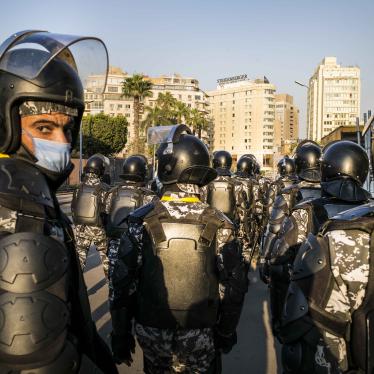(Beirut) – Public criticism and peaceful opposition to the government remain effectively banned in Egypt, Human Rights Watch said today in its World Report 2017. Security forces routinely tortured detainees and forcibly disappeared hundreds of people during 2016.
Having jailed tens of thousands of political opponents since the military’s removal of former President Mohamed Morsy in 2013, President Abdel Fattah al-Sisi’s government in 2016 took unprecedented steps to criminalize human rights work and cripple independent civil society groups.
“President al-Sisi’s government is consolidating and escalating repression,” said Joe Stork, deputy Middle East director at Human Rights Watch. “Absent strong responses from the international community, authorities will continue to squeeze the space for exercising basic freedoms into nothing.”
In the 687-page World Report, its 27th edition, Human Rights Watch reviews human rights practices in more than 90 countries. In his introductory essay, Executive Director Kenneth Roth writes that a new generation of authoritarian populists seeks to overturn the concept of human rights protections, treating rights as an impediment to the majority will. For those who feel left behind by the global economy and increasingly fear violent crime, civil society groups, the media, and the public have key roles to play in reaffirming the values on which rights-respecting democracy has been built.
In late November, Egypt’s parliament approved a highly restrictive draft law on associations that, if signed by al-Sisi, would place the work and funding of independent groups under supervision of a committee including representatives of the Interior, Justice and Defense Ministries and the General Intelligence Service, Egypt’s top spy agency.
In September, a Cairo criminal court approved a request from a panel of investigative judges to freeze the assets of three human rights groups and the personal assets of five people who founded or led such groups. Authorities have banned at least 15 group directors, founders, or staff members from traveling outside Egypt, most of them in 2016, since the judges opened their investigation into the foreign funding of such groups. On December 7, one of the investigative judges ordered the arrest and interrogation of Azza Soliman, founder of the Center for Egyptian Women’s Legal Assistance. Soliman was released after paying bail, but it was the first time the judges had ordered the arrest of a human rights defender.
Activists fear the judges will eventually charge them with illegally receiving foreign funding, punishable by up to 25 years in prison.
Officers of the Interior Ministry’s National Security Agency routinely tortured and forcibly disappeared suspects with few consequences. Many of the victims were accused of sympathy with or membership in the Muslim Brotherhood.
Between August 2015 and August 2016, the Egyptian Commission for Rights and Freedoms, an independent group, documented 912 victims of enforced disappearance by the police, 52 of whom had not reappeared by the time the group issued its report.
Between January and October, 433 detainees claimed that police or prison officers mistreated or tortured them in custody, according to the Nadeem Center for the Rehabilitation of Victims of Violence and Torture. Authorities froze the Nadeem Center’s assets in November and banned its co-founder, psychiatry professor and longtime anti-torture activist Aida Seif al-Dawla, from leaving the country.
The disappearance, torture, and murder of the Italian doctoral researcher Giulio Regeni, who was in Egypt to research labor unions, caused a diplomatic rift with Italy after media reports quoted unnamed members of the security services who said that they had arrested Regeni before his death.
United States President-elect Donald Trump, after a meeting with al-Sisi during the United Nations General Assembly in September, two months before his election, expressed “strong support for Egypt’s war on terrorism” and pledged that his administration “will be a loyal friend, not simply an ally” to Egypt.
“The international community should recognize that human rights in Egypt have deteriorated far beyond the repression that existed before the country’s 2011 uprising,” Stork said. “There needs to be concerted, coordinated effort to help preserve what is left of the country’s civil society before it is driven completely underground.”









